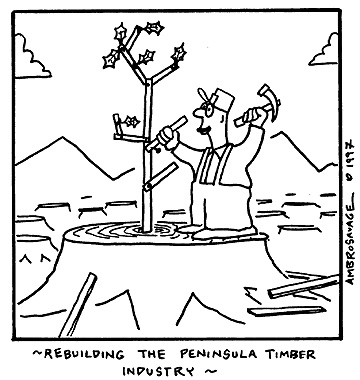


HOW HUMANS TREAT
THEIR SURROUNDINGS,
EACH OTHER, THEMSELVES
Anyone who has traveled Appalachia knows about man-made ugliness and the downside of a one-industry economy gone south. It doesn't matter the commodity. It could be textiles, coal, shoes, oil, timber-whatever. It's the lack of diversity that causes endless boom and bust cycles that in turn create a hunker-down mentality given more to survival than looking toward the future. From the very beginning of their existence, mill towns have been marked by pockets of chronic unemployment, foundering business prospects, depopulation, and a drifting and under-equipped subclass without adequate education, jobs, or hopes.
These problems exists in every timber community on the Olympic Peninsula. If history is any guide, transition from a one-industry based economy to one more diversified- which is the rage on the Peninsula right now - is not going to be easy. While state and federal efforts concentrate on keeping the wolves away with short term survival rations like food stamps, low income housing, Medicaid, and a middling effort at retraining, local leaders are left to figure out the angle to prosperity.
Washington state mostly considers its depressed areas a local problem. Various efforts to help the worst hit areas, such as Department of Community, Trade and Economic Development programs, The Public Works Trust Fund, and the Community Economic Revitalization Board have led to little more than attractive assortments of local storefront bureaucracies. Even the meager sales tax incentive enacted by the legislature in 1985, which was aimed at attracting new business to depressed areas, was stripped of its punch when it became a statewide program in 1995. Without some substantial incentive, there is no reason why a new business would chose Aberdeen/Hoquiam or any other Peninsula community over the booming I-5 corridor.
Oregon has tackled exactly the same problem with a long- term, statewide approach, involving income and property tax relief, and financial incentives for local business development. Oregon also pays more than lip service to the continuing need for new and improved infrastructure. That state has taken the attitude that the sooner local depressed areas prosper, the quicker the drain on the treasury from welfare payments and other forms of temporary relief will end. The effect has been dramatic, with unemployment dropping substantially in most rural areas of the state.

Prosper Ostrowski, Mayor of Port Angeles and a forester himself for 45 years, agreed with Buck, "I'm not apologizing for anything we did out there." Of course, indirectly they were referring to the lack of large quantities of Western Red Cedar, which is the primary wood used by Rayonier to make its specialty high value products. Since the beginning of forestry in the state of Washington, Western Red Cedar has been considered a trash product of the forest and most of it, to this day, is left lying on the ground to rot. In the meantime, a consultant has been hired to evaluate the feasibility of a new mill on the Rayonier site - after the toxic waste is cleaned-up from years of being the State's number one polluter.
"Red-Headed Stepson"
But turning back to the old ways does not seem an option, since what draws tourists is also attractive to new business: tidy communities and the physical beauty of the forest, rivers, and mountains. Tourism, like it or not, is the one industry able to provide a modicum of consistent income, and it is struggling in the most fundamental way for its identity. Tourism is not an industry for which any timber-oriented politician is ready to take the plunge. It is the "red-headed stepson" of county politics. Meanwhile, an internecine struggle between the local chambers of commerce in Clallam County rages over the use of advertising dollars raised from grants and room taxes. All the pettifoggery about sharing tourists and advertising dollars hides the fact that, with the exception of Port Townsend, most timber communities are an unsightly mess and not a compelling invitation to tourists or new businesses.
Given the shortage of funds and imaginative ideas from the state and federal governments, most Peninsula communities are going to have an impossible time putting their houses in order. With help, Grays Harbor and Clallam Counties could be exceptions. Both are blessed with potential that should be the envy of any depressed community in transition: solid timber bases (albeit third and fourth growth), and deep water harbors. Grays Harbor is particularly well situated with its access to the state's urban areas and national rail terminals. Port Angeles is one of the better entry points to the Olympic National Forest, and it is, at least for the moment, the gateway to Victoria B.C.
Rhetoric about the Bridge into the Twenty-First Century is already clichˇ. The political clime forbids consideration of any social or economic problem not connected to a moral or penal solution. And the words "long term" were excised from the economic and political lexicon decades ago. If there is any hope for transformation into prosperous communities under the state's go-it-alone policy, communities like Aberdeen/Hoquiam, Port Angeles, and others must make themselves over smartly, husband their precious financial resources, shed the warm feeling for the good old days, and raise hell in Olympia.
Judge Slaps SLAPP Against Incinerator Foes
The Strategic Suit Against Public Participation, or SLAPP, is an intimidation technique increasingly used against environmentalists. SLAPPS are defamation and libel actions brought against those who publicly criticize corporate environmental despoilers, with the aim of squelching free speech.
Environmentalist Starts Real "Wise Use Movement"
In a blow against Orwellian perversions of speech, former Northwest Friends of the Earth director David Ortman has received articles of incorporation for a "Wise Use Movement" to counter the use of that term by property rights advocates and extractive industries.
[Home]
[This Issue's Directory]
[WFP Index]
[WFP Back Issues]
[E-Mail WFP]





Contents this page were published in the May/June, 1997 edition of the Washington Free Press.
WFP, 1463 E. Republican #178, Seattle, WA -USA, 98112. -- WAfreepress@gmail.com
Copyright © 1997 WFP Collective, Inc.